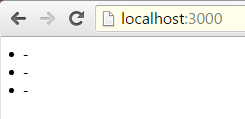manuel
October 16, 2015, 8:47pm
1
@sashko or anyone else who might know…
Why does the context (this) for #each collection is different than #each item in collection?
Using #each people
<body>
{{#each people}}
Name: {{contextName}}
{{/each}}
</body>
Template.registerHelper('contextName', function() {
return this.name; // this = { name: "Alan" }
});
Template.body.viewmodel({
people: function() {
return [ { name: "Alan" } ]
}
});
Using #each person in people
<body>
{{#each person in people}}
Name: {{contextName}}
{{/each}}
</body>
Template.registerHelper('contextName', function() {
return this.name; // this = { }
});
Template.body.viewmodel({
people: function() {
return [ { name: "Alan" } ]
}
});
I would have expected both to return { name: "Alan" }
when you use #each person in people there needs to be a person key in people
so in your first (and only loop) of people, there is still an item, just not a person
manuel
October 16, 2015, 9:30pm
3
Seems to be working as designed albeit not expected: https://github.com/meteor/meteor/tree/devel/packages/spacebars#each
The newer variant of #each doesn’t change the data context but introduces a new variable that can be used in the body to refer to the current item.
So how do you get the person object in a helper?
manuel
October 16, 2015, 9:31pm
4
Yes, but how do you get a hold of the person item?
{ person: {name: “Alan”} }
consider this array
[
When you ask for person that is what this so this.name will work as long as there is a person to extract
manuel
October 16, 2015, 9:37pm
6
Take 2: What do you put instead of **???** so the helper returns the name?
<body>
{{#each person in people}}
Name: {{contextName}}
{{/each}}
</body>
Template.registerHelper('contextName', function() {
return **???**.name;
});
Template.body.helpers({
people: function() {
return [ { name: "Alan" } ]
}
});
consider this array
[
{ person: {name: "Alan"}, role: {title: 'Caretaker', fte: 'part-time'}}
{ person: {name: "Clare"}, role: {title: 'Advisors', fte: 'part-time'},
{ person: {name: "Manuel"}, role: {title: 'Developer', fte: 'full-time'}
]
When you ask for person that is what this becomes so this.name will work as long as there is a person to extract from people
it remains in the data context but abstracts the key for you, to save you some work
for example take two same blocks
{{#each people}}
<li> {{role.title}} - {{role.fte}} </li>
{{/each}}
{{#each role in people}}
<li> {{title}} - {{fte}} </li>
{{/each}}
manuel
October 16, 2015, 9:53pm
8
You misunderstand how #each ... in ... works. Here’s your example:
<body>
{{#each role in people}}
<li> {{title}} - {{fte}} </li>
{{/each}}
</body>
Template.body.viewmodel({
people: function() {
return [
{ person: {name: "Alan"}, role: {title: 'Caretaker', fte: 'part-time'}},
{ person: {name: "Clare"}, role: {title: 'Advisors', fte: 'part-time'}},
{ person: {name: "Manuel"}, role: {title: 'Developer', fte: 'full-time'}}
]
}
});
That outputs:
manuel:
<body>#each role in people}}
Template.body.viewmodel({
Yes, sorry. I got that upside-down… late night here after a long week!
And you’re also right that this is unexpectedly empty
apologies for the goose chase
shock
October 16, 2015, 10:17pm
10
in both cases you acces it as {{ role.title }}#each would be just that 1 item it is iterating over#each role in, data context would be still whole array.
you can check by for example {{consoleLog this}} if u add helper to console log function parameter.
loren
October 21, 2015, 6:36pm
11
You can’t, but here is one workaround: https://github.com/meteor/meteor/issues/5280#issuecomment-145321706
(and feel free to add your opinion to issue discussion)
